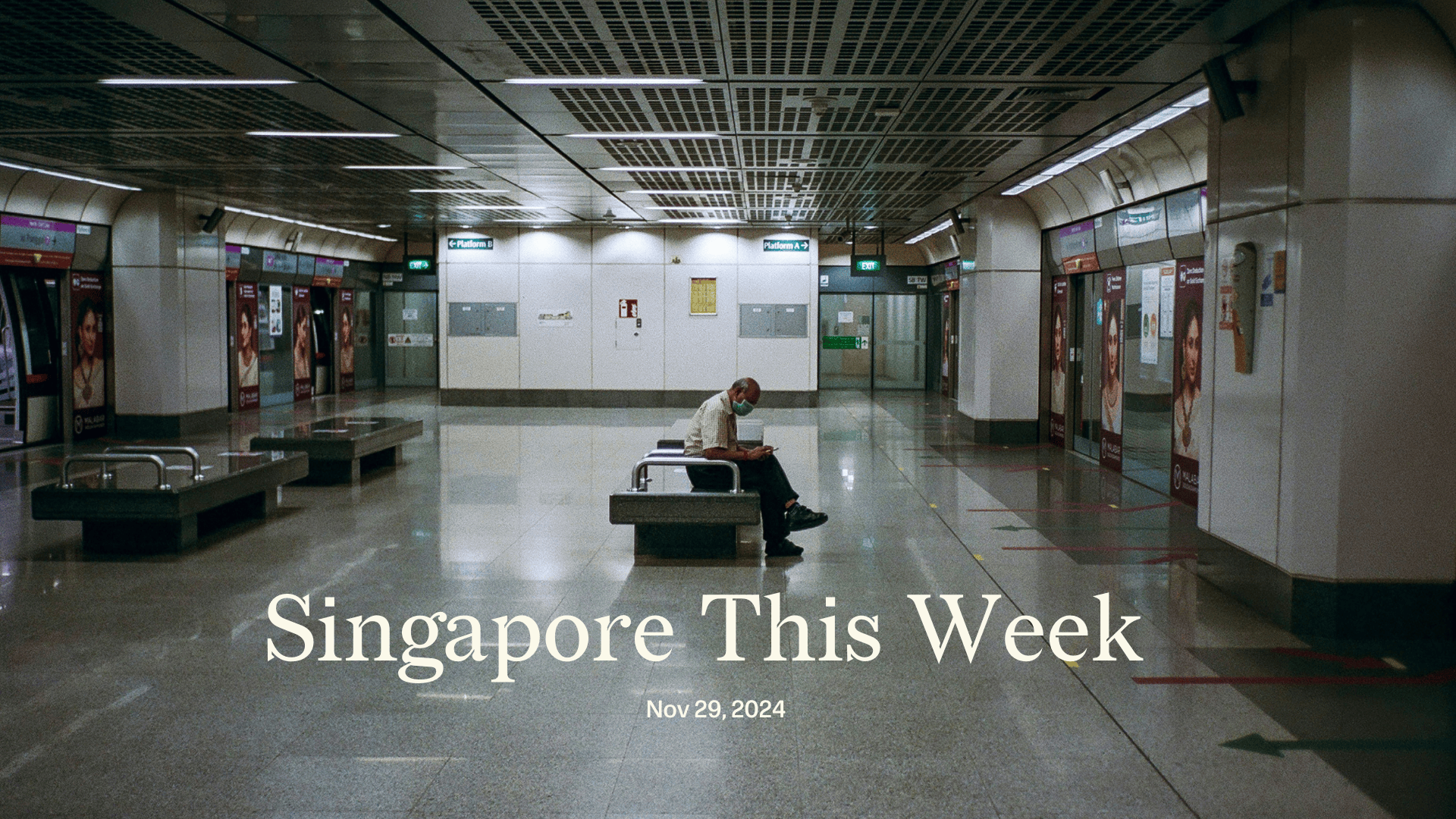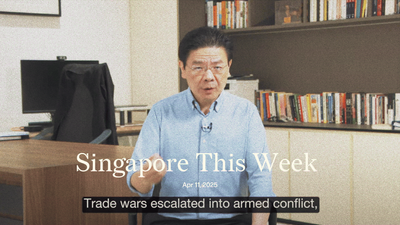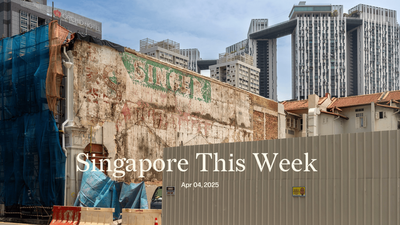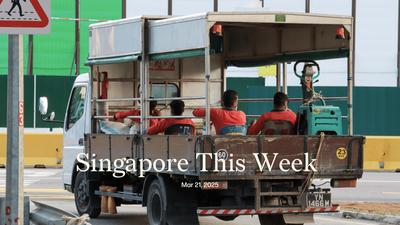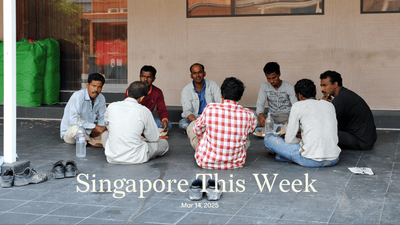Politics: Apt
As Lawrence Wong, prime minister, sashayed across the stage at the biennial conference of the ruling People’s Action Party (PAP), the K-Pop number “APT.”, by Rosé and Bruno Mars, blared across the hall at Changi Expo. The emcees tried to get grizzled, conservative, battle-worn PAP cadres to mimic the hand gestures of a youthful Korean drinking game. This single scene speaks to the bizarre, culture-colliding, virality-seeking, dystopia that is modern retail politics. At least Wong, shirt untucked and smiling throughout, saw the funny side of it: “I’m not sure why they played that music.”
The other tunes would’ve been familiar. Cadres elected many existing members, such as Lee Hsien Loong, senior minister, and K Shanmugam, home affairs and law minister, to the party’s 38th central executive committee. Chee Hong Tat, the transport minister who’s held his own in Parliament amidst the recent crises over an MRT breakdown and a payment system kerfuffle, is a new entrant. Josephine Teo, the unpopular minister for digital development and information, was the only full minister on the ballot to fail. Lee also confirmed that he’d step down as the party’s secretary-general and would propose Wong to take over. “I will neither be the first responder, [nor] the final decider,” he said, a curious admission that may make some wonder if he’ll remain both.
In what one analyst described as a “strategically calibrated, quasi-electioneering” speech, Wong reiterated themes that will likely dominate the next general election, due by November next year. It’s a “far more dangerous world” we’re living in—as it’s been for the past six decades. There’s no guarantee that the PAP will win—even though they hold over 90 percent of elected seats, as they have for the past six decades. And while the PAP is helping with cost-of-living issues, the opposition is merely exploiting it opportunistically without any “good solutions”—the same rascals they’ve been for the past six decades.
Cost-of-living concerns have affected elections from India to the US. Wong said that Singapore is hit by “global inflation trends”, but didn’t mention the numerous domestic structural factors, like the desire to attract high levels of foreign capital and labour, and the attendant tax policies to support that, which economists argue are domestic sources of inflation. Will voters be swayed by ever more vouchers and handouts, or will they vote for more fundamental change through the opposition? Will the PAP’s vote share go up or down? To answer that now, one could do worse than just sit in a circle, wave your hands around, and call out an apartment number. An apt song, Larry.
Society: ‘We sincerely apologise for any offence caused.’
Which literary approach would serve Jom best when writing about the latest “coloured” face incident in our modern, enlightened and empathetic paradise?
That’s irony out of the way, though maybe we need a polemic, aimed at a society that insists on clinging onto, almost celebrating, its ignorance, its apathy, and its tasteless humour. Our politicians feverishly chant “racial harmony” even as the very system they oversee muffles any voice that calls out rampant double standards. Deprived of discussion, most of us wonder: what the fuck is the fuss about? We scratch our heads, shrug our shoulders, and move on. Every. Single. Time.
Perhaps a formal, academic tone would be more appropriate. “Blackface”, with its long, racially charged history, is symptomatic of deeply rooted, structural inequalities that continue to express themselves in material and intangible ways across the world. Ethnic stereotypes essentialise entire peoples, allowing for them to be trussed up in cliches and, in more severe scenarios, mocked with impunity. The effects can be particularly deleterious on the minority groups already disempowered and disenfranchised due to their low socioeconomic status.
Satire? Eight UOL Group (UOL) employees recently paid tribute to the legendary pop band The Jackson 5 at a company event. They dressed up like the group, blackened their faces to resemble their idols, and boogey-ed away a presumably boozy night. Fresh, witty, original. Enter the social warriors, those machete-wielding drips eager to hack away at any tendrils of fun. The unsuspecting octet was accused of being inappropriate and culturally tone-deaf. The word “racism” was heard; offence was taken; feelings were hurt. This is exactly what imported “woke-ism” does. It wafts into havens, infects the young, and creates problems where none existed. Nonetheless, in an attempt to douse the rage and save society from another culture war, UOL has graciously rendered an apology. It is as refreshing and novel as its employees’ tribute: “We sincerely apologise for any offence caused,” the company said. Bravo.
Rants. Expositions. Parodies. Nothing can fully capture the frustration every such incident engenders. Will we ever learn? Do we want to learn? Is there anything new left to say? Or, as RF Kuang, author of Yellowface, a satirical work lampooning cultural appropriation in the American publishing industry, writes: “…you can only bang your head against the wall so many times before you start seeing stars.” Given how frequently Jom and others have written about it (see here, here, here and here), we may be on the verge of seeing the entire cosmos.
Society: An epidemic of lonely proportions
“All the lonely people/Where do they all come from?/All the lonely people/Where do they all belong?” Nearly six decades later, these lyrics from The Beatles’s “Eleanor Rigby” still hold true, and with greater relatability. The state of loneliness—often described as an experience of estrangement, or when a person’s need for meaningful social contact and relationships isn’t met—looks pretty dismal post-Covid 19. Many countries have declared it an “epidemic”, afflicting both young and old. In 2023, a Meta-Gallup survey of more than 140 countries found that nearly one in four people worldwide—that’s more than a billion people—feel very or fairly lonely. But loneliness isn’t simply a social concern, it’s also a potential health issue. Research shows that loneliness is associated with an elevated risk of a wide range of physical and mental health conditions, including cardiovascular disease, diabetes, anxiety and depression. Last year, the World Health Organization launched a Commission of Social Connection to address this “pressing health threat”. Governments too are taking it seriously. Japan and the UK have appointed ministers of loneliness, with the latter pumping millions of dollars into tackling the condition in its communities.
“Is being alone really so bad?”, pondered a headline in The Straits Times (ST). It’s a common misperception—of being alone versus being lonely—that’s perfectly captured in Eric Feng’s story as ST tells it. A man who was always surrounded by people—a professional speaker and self-proclaimed extrovert—didn’t realise he was lonely until the pandemic struck and he was forced into isolation. “When we were allowed to meet in groups of four or five, I thought to myself, ‘Oh no, who are my four close friends? Do I even have four?’,” he wondered. It’s the sensation of being lonely when one is alone, or even when in company, that’s making so many people feel sad and disconnected from the world around them.
To deal with loneliness in our hyper connected society, people turn to apps, social media, and even artificial intelligence for companionship. Alternatively, one can choose to embrace solitude. Though human beings are social creatures, there’s value too in being by oneself, in developing one’s capacity to be alone, which can in turn help build an inner security through self-discovery and self-realisation. And for those whose isolation isn’t voluntary, the kinship of community in our neighbourhoods—built upon the solidarity of strangers—will be society’s much-needed salve.
History weekly by Faris Joraimi
Recently, a video showing Hana-Rawhiti Maipi-Clarke, member of Parliament in New Zealand, leading the haka in the chamber, went viral. She was protesting the passage of the Treaty Principles Bill, a proposed law supported by right-wing parties that critics believe undermines principles established by the 1840 Treaty of Waitangi, the country’s founding document. Signed between representatives of the British Crown and over 500 Māori chiefs, the Treaty looms large in New Zealand’s national history. It’s been widely interpreted as creating a partnership of equals between the Indigenous people of Aotearoa (the Māori-language name for New Zealand) and the British settlers. While it isn’t technically law, its principles are referred to in Acts of Parliament and a commission exists to safeguard those principles. The Treaty remains a source of continuous debate and negotiation over the political and social arrangements between Māori and pākehā (white New Zealanders) that form the basis of New Zealand society. For example, the Treaty guaranteed Māori rights to possession and enjoyment of their natural resources, but hasn’t this been breached over years of colonial- and white-supremacist rule? Disputes also remain over whether the Treaty transferred sovereignty from the Māori chiefs to the British Crown and whether the latter can still claim sovereignty over New Zealand (as it still does).
While the Bill’s architects claim it will end legal inequality between races, critics argue it will erode Māori rights and worsen discrimination. Thousands have marched against it. Treaties still guarantee the status of many Indigenous peoples: in Canada, the “Numbered Treaties” signed between the First Nations and the Crown are still recognised under Canadian law. But we are all bound by treaties. Singapore’s not only party to many protocols, agreements and conventions that form our (ineffectual) international system; our founding also began with a treaty. Like Waitangi, it also established a joint government of three equal parties: the East India Company, Tengku Hussein (later made ‘Sultan of Singapore’ by the British) and Temenggung Abdul Rahman, who ruled Singapore under the Sultanate of Johor. This agreement was later dishonoured when John Crawfurd pressured the two Malay rulers to sign another treaty officially ceding sovereignty to the Company—exactly 200 years ago in 1824. Noticeably, this bicentennial year of the so-called “Treaty of Friendship and Alliance” has gone un-commemorated (we’ll have SG60 next year). I wish Singaporeans thought more about the implication of those two treaties, how we are all—generations after—still marked by a breach of trust with a high-sounding name. Given our shared colonial past, New Zealand’s debate isn’t too distant from Singapore. While the Waitangi Treaty and our 1824 Treaty have spelled contrasting arrangements for its respective Indigenous signatories, we can contend with questions this ongoing debate poses. At whose expense do we enjoy our rights? What obligations do we owe each other? How should we relate to the space we’ve come to inhabit?
Some further reading: in “Postcard from Aotearoa: coming into right relationship”, Unsu Lee writes about what we can learn from the Māori about mending our relationship with Mother Earth.
Arts: Thanks (for) giving
It’s that time of the year for the “Great Singapore Give”, where charities and nonprofits here hop on a different kind of Black Friday and Cyber Monday spend-wagon. Theatre company Pangdemonium, for instance, held its annual PangsGiving fundraiser last week. This “deconstructed Gala Ball” saw the likes of Hossan Leong and Denise Tan hosting well-heeled arts aficionados at high-end restaurants, including Burnt Ends and Marguerite, for up to S$1,200 a seat; its silent auction featured everything from signed musical merch to getaways on nearby private islands. Pangdemonium isn’t the only one pulling out the stops for patrons. Arts organisations here have long relied on private donors to sustain their programmes and, despite some uncertainty, arts giving has almost returned to pre-pandemic levels. Last year, individuals and corporations gave some S$50.2m to the arts both in cash and in kind. One of them was Lionel Choi, a wealth planner and private banker who gave over S$100,000 to Orchestra of the Music Makers. He told ST: “Funding in the arts is still a major issue and, relative to other things, grossly underestimated here. And if I, as a lover and supporter of the arts, do not contribute to support and grow it when there is an opportunity to, who will?”
If six-figure donations aren’t your thing, every bit still counts. For S$20, a steal for stars of this stature, you can get a front row beanbag to see performer-partners Lim Kay Siu and Neo Swee Lin strum their ukuleles in support of The Artground, a multidisciplinary arts space for kids. Proceeds from this upcoming concert and singalong will go towards its outreach programmes for neurodiverse and under-resourced communities. And, for S$16, you can score a seat to the fundraiser screening of “Plan 75”, the Japanese euthanasia drama that won big at the 2022 Cannes Film Festival. This tie-up between indie cinema The Projector and ArtsWok Collaborative, an arts-based community development nonprofit, pays particular attention to “living well and leaving well”: tackling end-of-life issues with both candour and humour. The screening will also feature the short film “Float Free”, where three Singaporean seniors learn how to swim and discover a new lease of life in the process. Living well is, perhaps, also about giving well.
Tech: Building design in minutes
Making buildings is a tall order. Design, cost, material selection, regulatory compliance, and systems integration across disciplines are all variables in an extremely complex equation. Architects, engineers, and consultants work separately, sometimes with conflicting visions and priorities. Time-consuming revisions and iterations are common.
Property start-up Podium hopes to change this through its technology platform that connects key stakeholders in the construction industry—developers, designers, and suppliers. The platform’s automation algorithms can generate detailed building models, taking into account factors like project cost, unit numbers, and specific building requirements. Its ability to incorporate supplier product data directly into the design process improves efficiency and accuracy, significantly reducing the time and effort required in the initial design phase. The platform’s prowess was on display in a recent trial project in which it generated a schematic plan for a ramp-up building—an industrial facility that allows heavy vehicles to go to the upper floors—in minutes. The task traditionally takes weeks.
Podium has generated significant excitement in the construction sector, raising S$20.4m from industry leaders like software maker Autodesk, elevator manufacturer Schindler, and real estate group Lendlease, which incubated it until it became an independent entity a few months ago.
Tech: Singapore continues to benefit from US-China semiconductor war
Graphics cards assembler PC Partner Group, has relocated its headquarters from Hong Kong to Singapore and made a secondary listing on the city-state’s stock exchange. The decision is driven by several factors, including Donald Trump’s threats to increase tariffs on Chinese products and tighten restrictions on exporting advanced semiconductor components to China. The company has also opened a new factory in Indonesia and plans to increase R&D and manufacturing in South-east Asia as part of its “China+1” strategy.
Singapore’s strategic location, strong infrastructure and favorable business environment make it an attractive alternative for companies spooked by the incoming American president’s tough trade talk. PC Partner Group, for instance, uses chips from Nvidia. Singapore accounts for over 15 percent of the semiconductor giant’s quarterly revenue, and houses an Nvidia supercomputer as well as its AI technology centre. The involvement of Nvidia’s vice-president at PC Partner’s Singapore listing ceremony underscores the importance of maintaining strong relationships with key technology partners while navigating these geopolitical challenges. At the moment, the country appears to be well-placed, given that it is home to nine out of the top fifteen global semiconductor firms such as GlobalFoundries, Micron and Siltronic.
If you enjoy Jom’s work, do get a paid subscription today to support independent journalism in Singapore.

